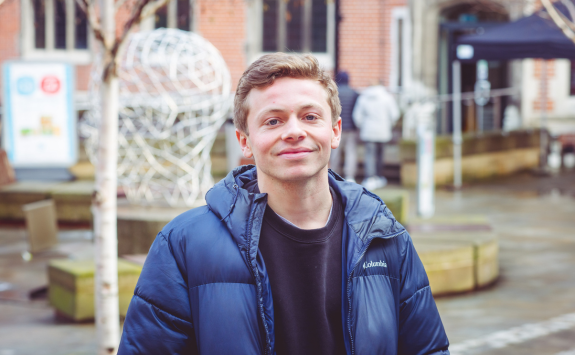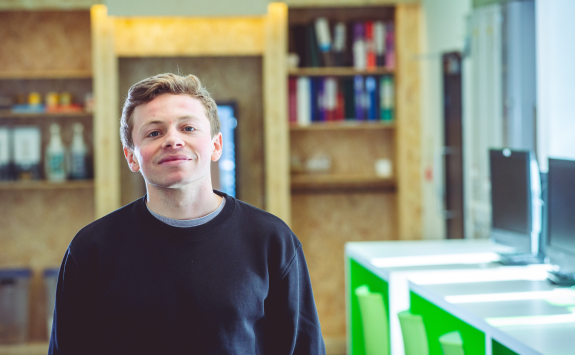Graduate and PhD student leading the way in net zero research
Freddie Young, a current PhD student in Mechanical Engineering and recipient of the Tony Trapp PhD Studentship, is revolutionising research in hydrogen combustion.
2 April 2025
The Tony Trapp PhD Studentship supports students in finding innovative ways to achieve net zero globally through their research. Freddie was the first scholar to receive this generous award in 2022, enabling him to pursue a PhD and conduct cutting-edge research on the global net-zero challenge while developing clean energy solutions.
Meet Freddie
Freddie’s inspiration for his PhD came from his third-year project on combustion, which sparked an interest in hydrogen as a sustainable energy source and set him on the path to pursuing a PhD. His work is motivated by the prospective use of hydrogen as a fuel for net zero emissions as it produces no carbon dioxide when burned. However, securing postgraduate funding proved to be a significant hurdle.
Freddie commented:
“There was no way I could self-fund. Receiving the Tony Trapp PhD Studentship was a massive opportunity. It covered my living expenses, tuition fees, and conference travel, which are all crucial for research development and networking. I’m incredibly grateful for this support.”

Pioneering hydrogen combustion research
Freddie’s research is dedicated to enhancing the viability of hydrogen combustion as a cleaner and more efficient energy alternative. Hydrogen has emerged as a promising fuel, especially for large-scale transport applications such as aviation and shipping, where electric alternatives face limitations. In these industries, reducing emissions, increasing efficiency, and ensuring safety are critical. Freddie’s research plays a key role in addressing these challenges.
Freddie explains:
“Many unique characteristics of hydrogen combustion are not yet fully understood. My work aims to analyse these complexities, refine current understanding, and provide insights that will aid in advancing hydrogen combustion devices - such as engines and power generators. To achieve this, I conduct high-fidelity computational fluid dynamics (CFD) simulations to investigate the unstable nature of premixed hydrogen-air flames. Understanding these instabilities is essential, as they can cause flashbacks or thermo-acoustic instabilities, which may lead to damage or even failure of combustors.”
Freddie’s work is driven by the potential of hydrogen to serve as a sustainable energy carrier, particularly considering that excess energy from wind and solar power can be used to produce hydrogen.
Freddie commented:
“The overarching goal is to deepen our fundamental understanding of hydrogen combustion physics and provide valuable insights that will support the design and optimisation of industry-scale combustors.”
Achievements and future aspirations
Freddie has already achieved significant milestones in his research journey. Over the past year, he submitted his first journal paper and travelled to Kyoto, Japan, to present at the International Conference on Numerical Combustion.
“It was an incredibly rewarding experience to share my research on flame-acoustic interaction and meet other researchers from around the world. The opportunity to attend conferences is invaluable and wouldn’t have been possible without the studentship funding.”
Looking ahead, Freddie is focused on finalising his analysis of flame-acoustic interaction and preparing a journal article. His next steps involve setting up simulations for swirl-stabilised flames, which are crucial for gas turbine engine technology.
Beyond his research, Freddie is also an active member of the academic community. He serves as a student representative for the Fluid Dynamics and Thermal Systems group and takes on teaching responsibilities, demonstrating in labs and tutorials.
While the future remains uncertain, Freddie is considering both academia and industry as potential career paths.
Freddie shared:
“I’d be open to both, but applying my skills in an industry setting was a key motivation for pursuing a PhD. The problem-solving, programming, and critical-thinking skills I’ve developed will be invaluable no matter where I end up.”
The impact of funding future research
Alumnus Dr Tony Trapp MBE generously donated £500,000 in 2021 to create an expendable endowment which supports PhD students researching net zero solutions. His generosity enables students like Freddie to push the boundaries of research in critical areas such as renewable energy and sustainable engineering.
As Freddie continues his research, his work stands as a testament to the power of philanthropy in advancing scientific discovery and addressing global challenges.
Please contact alexa.charlton@ncl.ac.uk if you would like to discuss your philanthropic giving.

